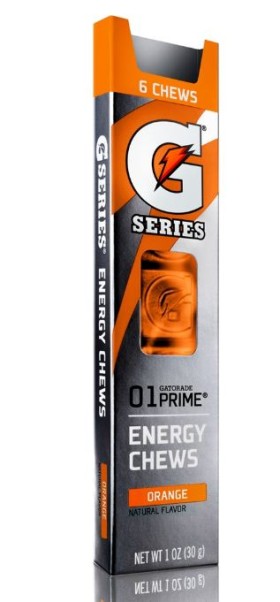
Energy Chews
To understand recovery you have to take a step back and remember the ultimate goal for training – to get better. High-intensity workouts cause muscles to become depleted of the nutrients that allow them to contract and relax with maximal effort. In order to become more powerful, the muscle has to first develop micro-tears. When the right nutrients are available, the body can quickly repair these micro-tears to not only heal the tissue, but to make it stronger. Without vital nutrients, however, the failure to repair the muscles will leave the athlete broken down, fatigued, and at high risk for injury.
Good recovery starts with fueling up prior to training. Imagine the difference between a nice cut of raw sirloin and a strip of beef jerky. Twist, tear, and pull at that raw sirloin and you will hardly damage it. The beef jerky, on the other hand, will be shredded on contact.
Athletes want their muscles to be like the sirloin, and filling up with carbohydrates and water prior to working out will decrease the amount of damage that is obtained throughout training. In an ideal situation, a volleyball player should eat a carbohydrate-rich meal three to four hours prior to training. This meal should include some whole grains, at least one piece of fruit, and a low- or nonfat serving of dairy. By providing three different kinds of carbohydrates, the absorption is maximized and the muscles can be filled to capacity.
Twenty to 25 grams of lean protein (a chicken breast, 3 ounces of tuna, three egg whites) will round out this meal to aid in decreasing muscle breakdown over the next few hours. The size of this meal will depend on the size and muscle mass of the athlete, but a good rule of thumb is to feel satisfied, but not stuffed after eating.
Prior to training or competition, the athlete should give a quick carbohydrate boost to their muscles with about 30 grams of carbohydrates. A 4-ounce snack cup of applesauce, ¼ cup of dried fruit, or quick energy bites, like Gatorade’s G Series Energy Chews, can be used to top off glycogen stores without weighing you down. Chase a carbohydrate snack with water or a sports drink to hydrate and watch your body perform to its full potential. Since early morning workouts can make fueling three hours prior impossible, these carbohydrate rich foods are even more important. Working out without eating can quickly result in overtraining and injury.
During beach tournaments, it is particularly important to get quick carbohydrates in between each match. On tour, the players’ tent may have good options. The National Volleyball League, for instance, takes great care in providing functional foods to their athletes. Fruit, granola bars, and turkey sandwiches or wraps are often included in their spread and can be used in between matches to refuel energy stores to allow your last hit to be as forceful as the first. Other good options might be yogurt, fruit smoothies, or rice bowls. Two additional important things to consider when making food choices are tolerance and temperature. Never eat something on game day that you have not practiced with before and always keep foods at a safe temperature (below 40 F for cold foods and above 140 F for hot items).
As soon as the workout is over, it is time to send in reinforcements. Carbohydrates, protein, and antioxidants are needed ASAP. Enzymes are released at the end of a workout that allow nutrients to be rushed into the muscle cells for speedy recovery. After 30 minutes, this opportunity is lost, and it is nearly impossible to achieve full recovery within 24 hours. Pistachios and dried cherries, a peanut butter and jelly sandwich, or Greek yogurt with ½ cup blueberries, are all solid options. Or sip on a Gatorade G Series Protein Recovery Shake, which delivers 20 grams of protein, and serves as a tasty post-workout treat (try chocolate or vanilla). Research shows that 20 grams of protein post-workout promotes muscle recovery, and that consuming more than that amount at one time does nothing to further stimulate muscle protein synthesis.
Lastly, remember to rehydrate. Drinking enough fluid is only half of staying hydrated; maintaining proper levels of electrolytes is equally important. Electrolytes are crucial to muscle contraction and relaxation. When athletes sweat, they lose electrolytes quickly, which can put them at risk for muscle cramps or heat illness. Drink sports drinks that will provide carbohydrates, sodium, and potassium during your workout to avoid excessive electrolyte losses. Humidity and temperature will dictate how much water an athlete requires. A good estimate is to drink 8-12 ounces every 20 – 30 minutes while on the court. On the beach, exposure to the heat and sun may increase this demand, but indoor with a controlled temperature, less may be adequate. When in doubt, check your weight before and after workouts. Any weight loss is due to sweat loss. Replace each pound lost with 16-20 ounces of liquid.
Being exceptional requires determination and planning. Many athletes know what they should be eating, but when it comes to implementing their plan, excuses emerge. As the great John Wooden said, “Failure to prepare is preparing to fail.” Take the extra time to prepare snacks or meals when a chaotic schedule prevents regular meals. Decrease the insult to your muscles during workouts by eating carbohydrates before training and give your body the ability to rebuild afterwards with protein, carbohydrates, and antioxidants.